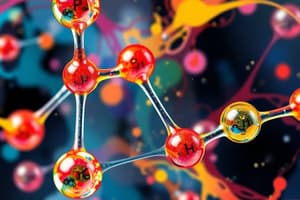Podcast
Questions and Answers
What is responsible for physical properties, such as boiling and melting points?
What is responsible for physical properties, such as boiling and melting points?
- Electronegativity differences
- Dipole-dipole forces
- Intermolecular forces (correct)
- Molecular shape
What is a measure of unequal sharing of electrons in a covalent bond?
What is a measure of unequal sharing of electrons in a covalent bond?
- Molecular shape
- Dipole moment
- Polarity (correct)
- Electronegativity
What increases from left to right across a period and decreases down a group in the periodic table?
What increases from left to right across a period and decreases down a group in the periodic table?
- Electronegativity (correct)
- Molecular weight
- Dipole moment
- Polarity
What influences the strength of dipole-dipole forces?
What influences the strength of dipole-dipole forces?
What type of molecules have a higher dipole moment than linear molecules?
What type of molecules have a higher dipole moment than linear molecules?
What increases boiling point?
What increases boiling point?
What can decrease boiling point?
What can decrease boiling point?
What influences boiling point trends?
What influences boiling point trends?
Flashcards are hidden until you start studying
Study Notes
Dipole-Dipole Forces
Intermolecular Forces
- Weak attractive forces between molecules
- Responsible for physical properties, such as boiling and melting points
- Includes:
- Dipole-dipole forces
- Hydrogen bonding
- London dispersion forces
Polarity
- Measure of unequal sharing of electrons in a covalent bond
- Results in a partial positive charge (δ+) on one atom and a partial negative charge (δ-) on the other
- Caused by differences in electronegativity between atoms in a bond
Electronegativity
- Ability of an atom to attract electrons in a covalent bond
- Increases from left to right across a period and decreases down a group in the periodic table
- Electronegativity differences between atoms in a bond lead to polarity
Molecular Shape
- Influences the strength of dipole-dipole forces
- Bent or V-shape molecules have a higher dipole moment than linear molecules
- Dipole-dipole forces are stronger when molecules are polar and have a bent or V-shape
Boiling Point Trends
- Dipole-dipole forces increase boiling point
- As molecular weight increases, boiling point also increases
- Branching or complexity in molecular shape can decrease boiling point
- Boiling point trends are influenced by a combination of molecular weight and dipole-dipole forces
Intermolecular Forces
- Weak attractive forces between molecules responsible for physical properties like boiling and melting points
- Comprise dipole-dipole forces, hydrogen bonding, and London dispersion forces
Polarity
- Measures unequal sharing of electrons in a covalent bond
- Results in partial positive (δ+) and partial negative (δ-) charges on atoms
- Caused by electronegativity differences between atoms in a bond
Electronegativity
- Ability of an atom to attract electrons in a covalent bond
- Increases from left to right across a period and decreases down a group in the periodic table
- Electronegativity differences lead to polarity in a bond
Molecular Shape
- Influences dipole-dipole force strength
- Bent or V-shape molecules have a higher dipole moment than linear molecules
- Dipole-dipole forces are stronger when molecules are polar and have a bent or V-shape
Boiling Point Trends
- Dipole-dipole forces increase boiling point
- Boiling point increases with molecular weight
- Branching or complexity in molecular shape can decrease boiling point
- Boiling point trends result from a combination of molecular weight and dipole-dipole forces
Studying That Suits You
Use AI to generate personalized quizzes and flashcards to suit your learning preferences.




